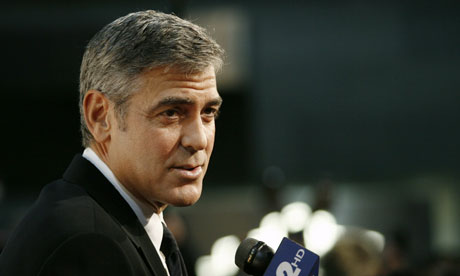
George Clooney hopes that the Satellite Sentinel Project, funded by the Not on Our Watch organization, can ‘stop a war before it starts’. Photograph: Kimihiro Koshino/AFP/Getty Images
Google has joined the UN, Harvard University and a pressure group founded by George Clooney to use satellites to scour Sudan for evidence of state-organised violence before next month’s referendum that could see the country split in two.
Clooney said that he had launched the Satellite Sentinel Project to “stop a war before it starts” by warning the government in Khartoum that it would not be able to hide war crimes from the rest of the world, as it did for so long in Darfur, if there is violence in southern Sudan, which is likely to vote on 9 January to secede.
The project plans to reduce the waiting time for satellite images from more than a fortnight to less than 36 hours. The images will be scrutinised by the UN for evidence of mass movements of people, destruction of villages and other indicators of organised violence. The Harvard Humanitarian Initiative will also study the pictures.
The images will immediately be made public. If there is evidence of war crimes, appeals for action will be led in part by the Enough Project, an anti-genocide organisation led by the author and activist John Prendergast.
Clooney and Prendergast said today in a statement that there was a serious threat of violence.
“The government in Khartoum has armed militias in contested bordering regions, the government air force has bombed border areas, and both sides have massed military units and equipment along the hottest border spots,” they said. “These areas have witnessed some of the most deadly conflict in the world since world war two. The former director of national intelligence says that southern Sudan is the place in the world most likely to experience genocide.
“We were late to Rwanda. We were late to the Congo. We were late to Darfur. There is no time to wait.”
The referendum is the result of a 2005 peace deal to end more than two decades of civil war that cost more than two million lives. Sudan’s president, Omar al-Bashir, has committed himself to respecting the result of the oil-rich south’s vote. But there has already been violence amid accusations that the government is funding armed groups opposed to independence. Last week, the US vice president, Joe Biden, called Sudan’s second vice president, Ali Osman Mohmed Taha, to express Washington’s concern about potential violence.
Jonathan Hutson of the Enough Project said that advances in technology had given humanitarian organisations an advantage that should help not only expose violence but prevent it. “This project is leveraging Google map makers open source platform to wage peace. Unlike previous satellite imagery gathering projects which were after-the-fact documentation exercises, this project aims to stop a war before it starts,” he said. “War criminals thrive in the dark. They behave differently when you shine a media spotlight on them, when you give them notice that satellite imagery can be quickly shared with the world. This is an open source public platform for waging peace and this transforms anti-war efforts from now on.”
“Passing over Sudan at any given time are perhaps a dozen commercial satellites that have high resolution images available for purchase. The cost barrier has been the key factor that has limited the effective use of satellite imagery analysis in the human rights field,” Hutson added.
The Sudan initiative is being funded for six months by Not On Our Watch, an organisation co-founded by Clooney and other film stars such as Matt Damon and Brad Pitt. “We want to let potential perpetrators of genocide and other war crimes know that we’re watching, the world is watching,” said Clooney.
guardian.co.uk, Wednesday 29 December 2010 20.58 GMT
